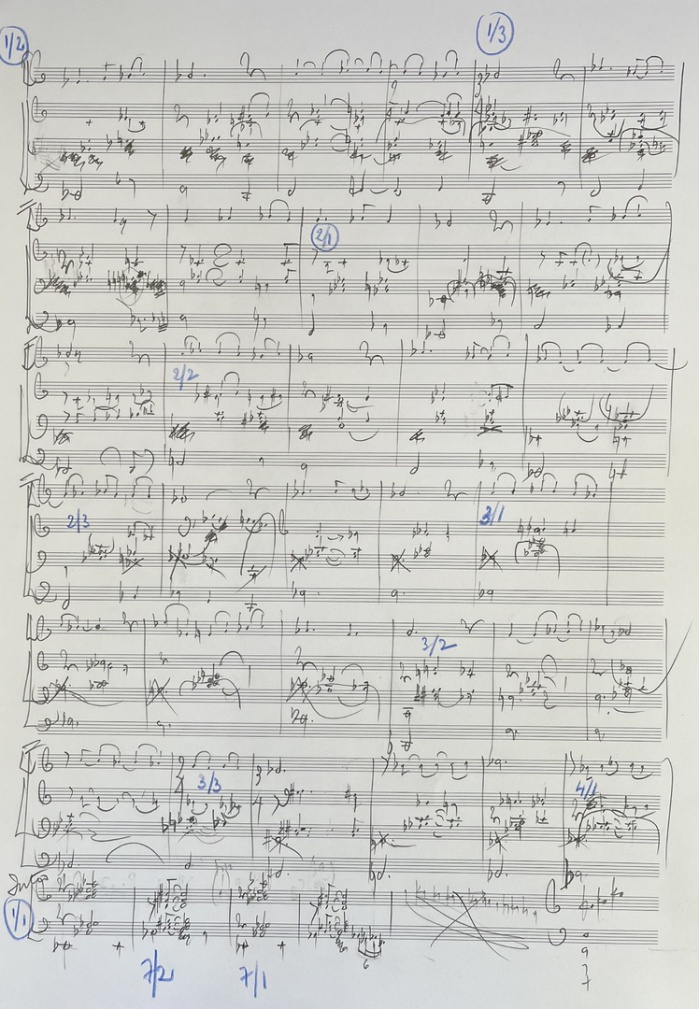
OUR LADY'S MINSTREL for clarinet an piano
Title, Duration, Place, Year, Publisher, Dedicated to, Premiere (performer(s), place, date)
OUR LADY'S MINSTREL, Prelude and Dance for clarinet and piano (12') - Three Poems for soprano and piano (12'), 24', Chatou, 2017, Schott, to Regula Schneider, -, -. Other versions 1/ for clarinet and organ 2/ for violin and piano.
I. Our Lady's Minstrel - Prelude and Dance for clarinet and piano
Our Lady's Minstrel is an ensemble of two works : Prelude and Dance for clainet and piano, and Three Poems for soprano and piano, inspired by a tale of mediaeval France, Le Jongleur de Notre-Dame (Our Lady's Tumbler), after an idea of my daughter, Katia-Sofía Hakim. The works could be played either separately or in a same program in the following order : Prelude - Three Poems - Dance.
The Prelude paraphrases the gregorian Salve Regina simplex in a slow expressive waltz style. The Dance is a gipsy-like plurithematic sonata form with a serene waltz in the middle-section recalling the Prelude.
The Three Poems for soprano and piano use selected verses from the English translation of Le Jongleur de Notre-Dame, Our Lady's Tumbler [1898, Isabel Butler]. The music is through composed, following the structure of the text, in a syllabic style. The declamatory initial poem, Most Sweet Queen, is followed by the bouncing and joyful display of the central piece, Most Sweet Friend, before the venerating last verse, Holy Mary.
Texts of the Three Poems
Most sweet Queen, of your grace and your mercy despise not my service, for I serve you for your delight, you are the highest joy, whoever reckons all the world.
Most sweet Friend, right gladly I honor you with my heart and my body, my feet and my hands. I will tumble, leap and dance. I will skip and spring till I can do no more. Henceforth will I be your minstrel.
Holy Mary, most sweet Lady, noble and gentle, none so beautiful ever born, into your care I commit me, to you, I commend me, body and soul.
II. Our Lady's Minstrel - Three Poems for soprano and piano.
Our Lady's Minstrel is an ensemble of two works : Prelude and Dance for clarinet and piano, and Three Poems for soprano and piano, inspired by a tale of mediaeval France, Le Jongleur de Notre-Dame (Our Lady's Tumbler), after an idea of my daughter, Katia-Sofía Hakim. The works could be played either separately or in a same program in the following order : Prelude - Three Poems - Dance.
The Prelude paraphrases the gregorian Salve Regina (tonus simplex) in a slow expressive waltz style. The Dance is a gipsy-like plurithematic sonata form with a serene waltz in the middle-section recalling the Prelude.
The Three Poems for soprano and piano use selected verses from the English translation of Le Jongleur de Notre-Dame, Our Lady's Tumbler [1898, Isabel Butler]. The music is through composed, following the structure of the text, in a syllabic style. The declamatory initial poem, Most Sweet Queen, is followed by the bouncing and joyful display of the central piece, Most Sweet Friend, before the venerating last verse, Holy Mary.
Texts of the Three Poems
Most sweet Queen, of your grace and your mercy despise not my service, for I serve you for your delight, you are the highest joy, whoever reckons all the world.
Most sweet Friend, right gladly I honor you with my heart and my body, my feet and my hands. I will tumble, leap and dance. I will skip and spring till I can do no more. Henceforth will I be your minstrel.
Holy Mary, most sweet Lady, noble and gentle, none so beautiful ever born, into your care I commit me, to you, I commend me, body and soul.
III. Preface for the performance of the two works in a same programme :
Our Lady's Minstrel - Prelude for clarinet and piano - Three Poems for soprano and piano - Dance for clarinet and piano
Our Lady's Minstrel is an ensemble of two works : Prelude and Dance for violin and piano, and Three Poems for soprano and piano, inspired by a tale of mediaeval France, Le Jongleur de Notre-Dame (Our Lady's Tumbler), after an idea of my daughter, Katia-Sofía Hakim. The works could be played either separately or in a same program in the following order : Prelude - Three Poems - Dance.
The Prelude for clarinet and piano paraphrases the gregorian Salve Regina (tonus simplex) in a slow expressive waltz style.
The Three Poems for soprano and piano use selected verses from the English translation of Le Jongleur de Notre-Dame, Our Lady's Tumbler [1898, Isabel Butler]. The music is through composed, following the structure of the text, in a syllabic style. As in the clarinet pieces, the colourful harmonies and rhythms are influenced by jazz. The declamatory initial poem, Most Sweet Queen, is followed by the bouncing and joyful display of the central piece, Most Sweet Friend, before the venerating last verse, Holy Mary.
The Dance for clarinet and piano is a gipsy-like plurithematic sonata form with a serene waltz in the middle-section recalling the opening Prelude.
Texts of the Three Poems
Most sweet Queen, of your grace and your mercy despise not my service, for I serve you for your delight, you are the highest joy, whoever reckons all the world.
Most sweet Friend, right gladly I honor you with my heart and my body, my feet and my hands. I will tumble, leap and dance. I will skip and spring till I can do no more. Henceforth will I be your minstrel.
Holy Mary, most sweet Lady, noble and gentle, none so beautiful ever born, into your care I commit me, to you, I commend me, body and soul.

